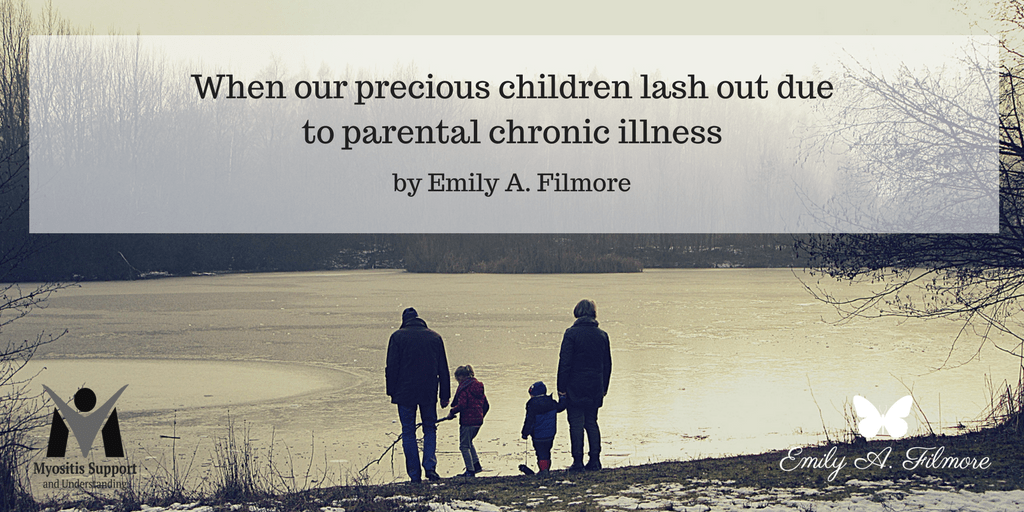Living with, and trying to overcome, autoimmune diseases affect all the people we love. Those of us who have children see this play out every day. My 12-year-old administers my methotrexate shots, rubs my sore muscles when my husband is not at home, cooks meals when I am unable, and even helps me bathe and dress when I am too weak to do it alone.
She has stepped up to be more responsible than typical for far more years than I like to think about. At times, I feel enormous guilt when I consider the innocence of her childhood that she has lost, but then again, I look at her and realize the depths of her empathy and compassion as they manifest in her interactions with others and I am so proud to know that she has processed her experience into something positive.
This does not mean that she has escaped unscathed. Just as there are times when I get angry, frustrated, sad, and overwhelmed with my condition, she must have the same emotions. There are times when she, my precious, loving, beautiful, helpful girl becomes angry and resentful…even saying hurtful things to me about my physical weaknesses, about my pain, about the difficulties we face, and even about some of the limitations she has faced because of my illness.
As the author of spiritual parenting and children’s books, I (and my husband) live consciously. Therefore, we try to keep in mind that when she lashes out, it is from a place of pain, so I am usually able to maintain my composure and not yell back. I am not saying I am perfect, nor that my feelings don’t get hurt. I am human after all, and it’s upsetting to be yelled at by your child because you aren’t meeting their expectations, even if it’s out of your control. But I try to meet her from where she is coming in the moment and allow her to process whatever it is that she is feeling. When all else fails, I call in my husband, and he calms me down, first, then talks to her to help her get perspective on why she is feeling angry and how none of what she is angry about is her or my fault. This is a strategy he and I also employ in our own relationship, as discussed in The Marvelous Transformation: Living Well with Autoimmune Disease. We believe there is nothing insurmountable when we work together.
We also believe, wholeheartedly, in counseling. We have employed it at various times of my health journey, either conventional or spiritual counseling. Sometimes it is helpful, both for me, the patient, and for family members and caregivers, to have a neutral sounding board to work through feelings and fears about chronic illness, autoimmune disease, and all the aspects surrounding it. There are counselors who are specifically trained in grief and chronic illness.
I often hear from other people with myositis, and other chronic illnesses, that these same issues arise with their children. I think it’s important, as parents, that we take a step back, breathe and remember that they are children, and the deficits they perceive in their lives are not our fault. Also, the behaviors (anger, lashing out, etc.) they are exhibiting are not our fault either. They are not bad parenting, nor disrespect, “attention-seeking,” nor even bad behavior. They are purely the result of pain and discomfort and maybe even a little bit of misunderstanding, frustration, and fear. All things that are very natural for a child dealing with a sick parent.
Giving your child understanding and love, while not sacrificing your right to feel understood is paramount in the moment. This will acknowledge and validate their feelings. Additionally, finding a professional to talk to who can work with your family on those topics may be beneficial. If that is not possible, encouraging your children to be open and honest about how they feel about your illness and the realities of daily life surrounding it may help them to not bottle up their feelings and later unload those feelings inappropriately, ie. in anger.
I often hear from other people with myositis, and other chronic illnesses, that these same issues arise with their children. I think it’s important, as parents, that we take a step back, breathe and remember that they are children, and the deficits they perceive in their lives are not our fault.
Finally, it’s a good idea to remember that you are not at fault for being sick, and that when you are doing your best to balance home life and medical health sometimes you can’t please everyone. Please try to find middle ground where you don’t feel guilty. Sometimes you can make your bad days a game by having pajama parties, ordering food in, letting the house work go – just a little! – and letting your family know how much you love and appreciate them for what they do for you and with you, knowing that while life may not be “normal” it is good anyway because you are together!
No matter how you handle the feelings of your children, I send you and your family wishes of good physical and mental health.
Tags: chronic illness communication family support











Hi there, Kathleen, now that my daughter is almost 18 she has experienced the entire spectrum of emotions throughout her life and my illness. She has experienced resentment and anger at my illness, and me, gone through the stages of grief, and has continued to be very helpful and loving at other times, even though, as Jerry mentioned, we have given her room to talk and express herself throughout her life. I don’t think there is any feeling that is unnatural for a child of any age when a parent is sick. I certainly feel all the feelings myself. I hope your family members are able to get support.
Emily
Hi Kathleen – Thank you for your comment. I am sorry to hear your daughter’s kids are angry and resentful. I so wish more people would understand what it’s like to live with myositis even when we may not “look sick.” As for Mrs. Filmore, her daughter grew up with her mom sick and she really talked to her about it throughout her life. So I think the experiences may be different. We are here for you. We have so many support groups so I hope you will join us to talk about these things. Wishing you the best!
Another DM sufferer, our daughter’s grown children(girls: 26, 23,21), are angry and resentful. Is this similar to Ma.Filmore’s experience?
delphineum.irish@gmail.com